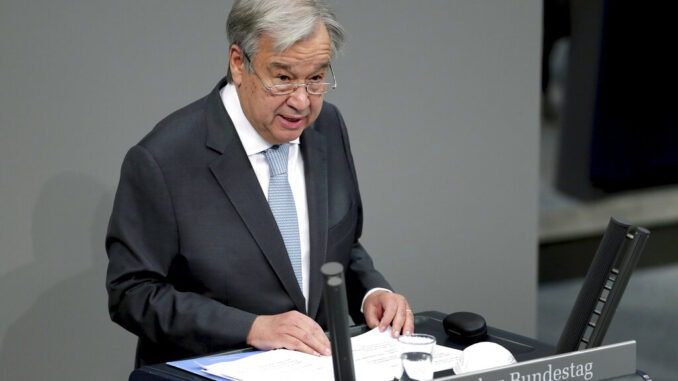
UNITED NATIONS — The United Nations kicked off the selection of its next secretary-general, asking the 193 U.N. member states to submit candidates to be the world organization’s chief diplomat and operating officer.
The process officially began with a joint letter signed virtually by General Assembly President Volkan Bozkir and Britain’s U.N. Ambassador Barbara Woodward, this month’s president of the Security Council opening the nomination of candidates.
Secretary-General Antonio Guterres, whose current term expires on Dec. 31, announced last month that he is seeking a second five-year term.
Honduras’ U.N. Ambassador Mary Elizabeth Flores Flake also sent a letter to all U.N. member nations saying there has never been a female secretary-general and asking them to “present women candidates.”
“I am writing this communication from a place of conviction, where standing for equal rights makes a difference in creating a fair and equitable organization, and opening opportunities for women all over the world,” Flores Flake said.
A 2015 General Assembly resolution, which was adopted by consensus, changed the previously largely secretive selection of the secretary-general to a more open and transparent process. It allowed the world body’s member states for the first time to see basic information about all candidates, including their resumes, and to meet and question them at open sessions.
Just before Christmas, a group of 25 nations from all regions called the Accountability Coherence and Transparency group wrote to the General Assembly and Security Council urging that the selection process for the next secretary-general meets “at a minimum” the 2015 standards of transparency and involvement of the 193 U.N. member nations.
Guterres’ election was a disappointment to women, who had hoped to break the all-male hold on the post, and to East Europeans who have never had a secretary-general from the region. It was supposed to be next in the informal geographical rotation for U.N. chief when Guterres, a Portuguese, was elected.
The General Assembly elects the secretary-general on the recommendation of the 15-member Security Council where the five permanent members — the U.S., Russia, China, Britain and France — have veto power, so their support is crucial.
In the 2016 race, there were 13 candidates vying to be secretary-general, seven women and six men, and the General Assembly held open interviews for each of them, where ambassadors from all countries could ask questions. Six straw polls were held in the Security Council between July and October, and Guterres led in all of them.
The current election is the first under the 2015 resolution where an incumbent is seeking reelection. Whether any candidates are put forward to challenge him remains to be seen.

